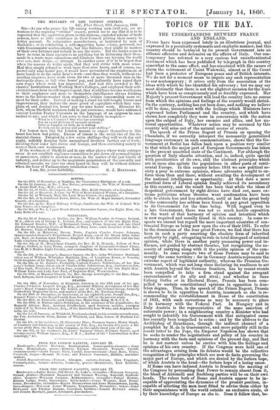THE MISTAKES OF THE LONDON STRIKES.
147, Fleet Street, 12th January, 1860.
Sr—As one who passes his life among working men (will you, ere at- tention to the expiring "strikes" ceases), permit me to say that it is to be regretted that the operatives given to this ruinous, exploded scheme of trade redress, have so little confidence in their Council putting their money to letter account. By cooperative manufactures, as instituted by men of Rochdale; or in conducting a self-supporting home colony, governed, not with Communistic sentimentality, but like Saltaire, they might be masters of their own fortunes and nobody be any the worse. But the trades seem to have no trust in their executives in anything but in disbursing their thou- sands in a waste more calamitous and fatuitous than any tyranny the world ever saw, dare devise, or attempt. In another sense it is to be hoped that when the masons do strike again, that they will strike with more sense. Had they simply refused to work more than nine hours and of course, ex- pected only nine hours' pay, it would have necessitated employment of more hands to do the extra hour's work—and thus they would, without ex- pending sixpence, have made room for two or more thousand men in the metropolis alone, at full nine hours' pay, and indirectly have raised their own wages where work was imperative. An& had they crowded to Me- chanics' Institutions and Working Men's Colleges, and employed their self- elected leisure hour in self-improvement, they would have become worth more to their employers and more to themselves (intelligence always fetching more in the labour-market than stupidity), besides commanding more re- spect for their order. Instead of making a stand for self-bought leisure and improvement, they imitate the mere greed of capitalists which they com- plain of, and demand ten hours' pay for nine hours' work. Ebenezer El- liott, whom Sheffield workmen hold in just reverence, would have addressed current London Trades' Unionists in the language of an epigram he once recited to me ; and which I am sorry to find it timely to requote- ,. What is a Unionist I One who has 7-earnings
For an equal division of unequal earnings: Idler or bungler, or both, he is willing To fork out his penny and pocket your shilling."
For honest men like the London masons to expose themselves to this taunt has been bad policy. Excess of labour is the social vice of the in- dustrial classes. Tempted by a few extra shillings they will wcrk day and night, selfishly keeping their unemployed brethren further out of work ; dividing their order into slaves and tramps, and then convulsing society to correct their own weaknesses.
If the workmen of Sheffield and in any other places where trade outrages occur do not establish vigilance committees to put down all personal injury or annoyance, either to masters or men, in the matter of the just liberty Of industry, and deliver up to the magistrate perpetrators of the cowardly and criminal assaults we have too often heard of, they will be without defence when the hour of Parliamentary retaliation comes.


























 Previous page
Previous page